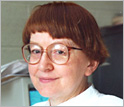|

Discovery
High Energy Physics Center Attracts U.S. Undergrads to Summer in Switzerland

Apprenticeship at the European Laboratory for Particle Physics (CERN) in Geneva, Switzerland
January 27, 2005
A semester abroad. In the world of science, the phrase might bring to mind any number of unique educational opportunities, from operating a state-of-the-art radar system in Colorado to counting butterflies in Costa Rica. For serious physics students, the summer semester of their dreams might well be an apprenticeship at the European Laboratory for Particle Physics (CERN) in Geneva, Switzerland.
A leading high-energy physics center, CERN is viewed by many as the world’s premier international scientific laboratory. It is also the birthplace of the World Wide Web. But perhaps most importantly to aspiring physicists, it hosts an international collaborative and partnership program in physics research that brings students together from all over the world for hands-on research.
Cutting-edge experiments on anti-matter, and detector design and construction are the kinds of research being explored by a select group of undergraduates in an on-going Research Experiences for Undergraduates (REU) program funded by NSF's Division of Physics (PHY) and Office of International Science & Engineering (OISE). Overseen by Principal Investigator Dr. Homer Neal and co-PI Dr. Jean Krisch, both from the University of Michigan, the summer REU program at CERN recruits 9 to 15 students each year to focus on early career international training in physics. Participants are recruited from large and small institutions across the United States, with a special effort directed at Historically Black Colleges and Universities and institutions with a large Hispanic enrollment.
During their 8-9 weeks at CERN, U.S. students participate in the day-to-day ongoing research in particle physics, which explores the fundamental nature of matter and the basic forces that shape our universe. They attend a physics lecture series presented by the world's foremost physicists, work with assigned mentors, and interact with European scientists and science students. They gather frequently to give talks about their research activities, culminating in final presentations, which are recorded and, if the student wishes, made available on the University of Michigan website for their peers and the general public (see link below).
But a summer at CERN is not all high voltage and colliding protons. Students enjoy a trip to Bern to visit the Einstein Museum, as well as any number of cultural opportunities in and around Geneva itself. A significant part of the experience is the sense of international camaraderie and shared purpose.
According to Dr. Neal, “The opportunity provided by the University of Michigan CERN REU program for students to work alongside some of the most productive scientists in the world, to attend the prestigious CERN Summer School, and to observe how modern scientific research is conducted in an international setting, is one that can have an extraordinary impact on the lives of students. It broadens their horizons scientifically and culturally, and helps the U.S. train the next generation of its scientific leaders.”
The NSF-funded program at CERN has broad impacts both inside and outside of pure science. The underrepresentation of minorities that currently exists in science, mathematics and engineering has often been associated with students lacking a clear picture of what it is like to be a researcher in these areas, how research is done, and uncertainty about the ability to compete. The power of a REU program can be enormous; a successful summer experience of even one student at a site such as CERN can suggest to other students that they too could profit from such an experience in a subsequent year.
A heightened sense of excitement surrounded Summer 2004 REU students at CERN, with construction of a Large Hadron Collider (LHC) underway and due to switch on in 2007. The LHC is a particle accelerator that will collide beams of protons to probe deeper into matter than previously possible. When completed, the LHC will represent the frontier for experimental high energy physics for several decades to come.
"As one of the individuals responsible for the creation of the original NSF REU program, I have been delighted to see the impact of the program over the decades and, more recently, to see its value as an instrument to insure that U.S. undergraduates have access to the top research facilities even when some of those facilities are located at sites outside the U.S.“ says Dr. Neal.
The students training at CERN now will be the U.S. scientists of the future; this REU program is a major contributor to the NSF goal of developing a diverse, internationally competitive, and globally engaged scientific and engineering workforce. The integration of research and education attracts a diversified pool of talented students into careers in these disciplines, and helps ensure that these students receive the best education possible.
Investigators
Homer Neal
Jean Krisch
Related Institutions/Organizations
University of Michigan, Ann Arbor
Locations
Michigan
Switzerland
Related Awards
#0139604 REU Site Proposal: Support of a Site REU Program at the European Laboratory for Particle Physics
Years Research Conducted
2002
Total Grants
$350,000
Related Websites
University of Michigan CERN REU: http://www.um-cern-reu.org
CERN REU Student Presentations: http://wlap.physics.lsa.umich.edu/umich/phys/um-cern-reu/
|








